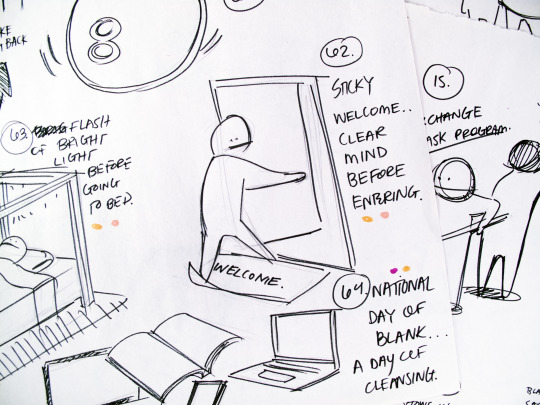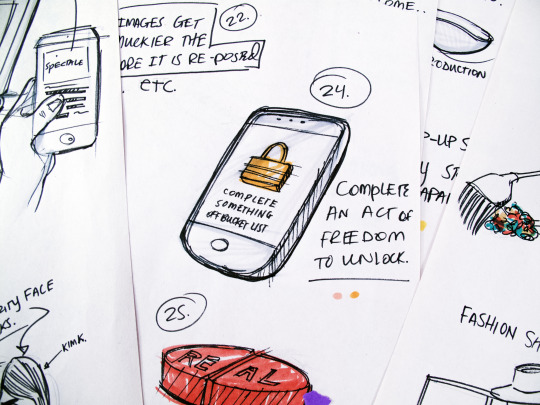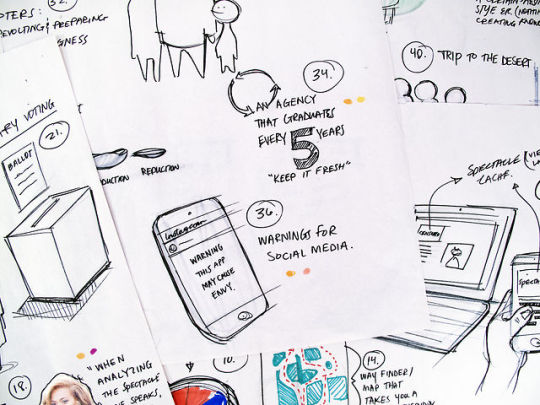Text
The Manifestation of a Mobile Manifesto Truck
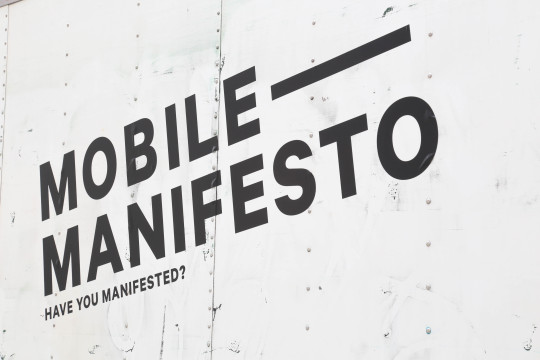
On Saturday March 28th I went on a journey with a few of my classmates and friends to help people create a manifesto id card. This experience happened inside of a 14′ box truck parked by Mccarren Park in Brooklyn. The experience featured a large 5′ x 3′ card which participants can write a manifesto and take a picture in front of, that was turned into a pocket size manifesto id card. I provided words and phrases from other artists manifestos and brand mission statements to help the participants with their tone of voice.
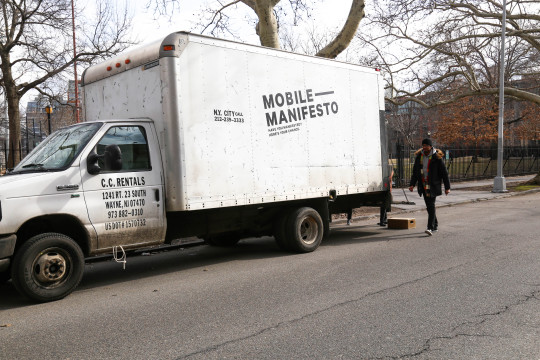
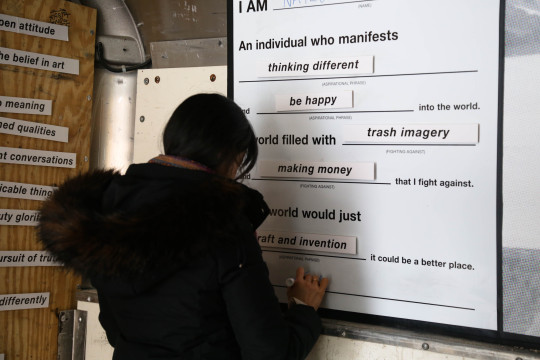
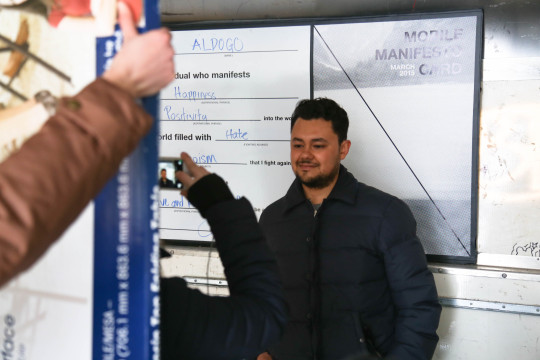
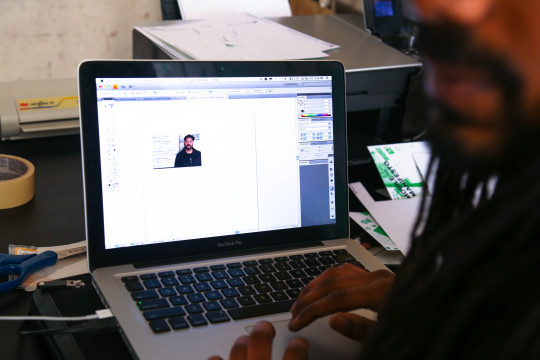
In our fast paced society we leave little time for ourselves to understand our true desires and intentions within our precious lives. A manifesto helps us do this, and the sole purpose of this experience was to get people to begin to think about their true desires and intentions. Objects, experiences, and services of consumption plays on our lofty intentions and desires that are difficult to achieve. It is up to us to combat this by getting to know ourselves and doing what we truly intend to do in this world.

Before doing this experience I understood that people could not always articulate their true desires and intentions, I have trouble doing this myself. But giving people an opportunity and platform to do this, they will be able to excel at figuring this out. This my biggest take away from this experience, I need to move forward with giving people a platform to manifest their selves in a genuine and enjoyable ways.
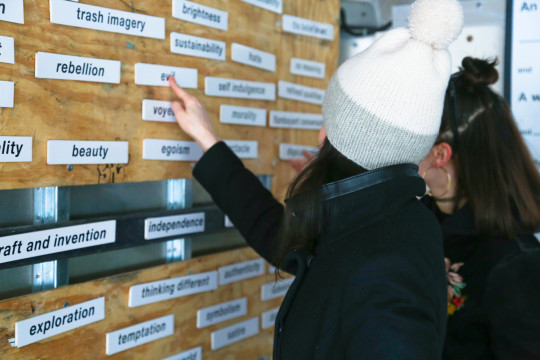
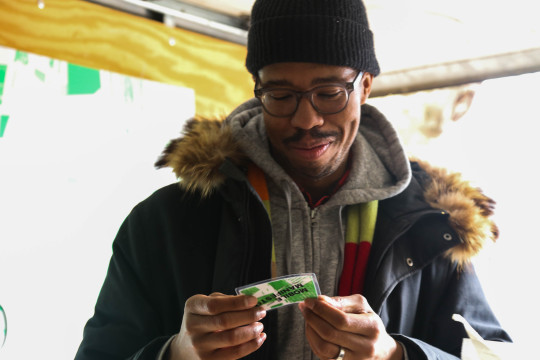
0 notes
Text
A Manifesto
Jean Baudrillard starts to describe objects of consumption and consumerism in his book “System of Objects” as objects that become signifiers of one’s status and personality. Once these objects loose their concrete relationship (for example: a chair that has the main purpose of sitting and not decoration) with their owners they become frivolous and vain.
We are taught that we should buy more things for our economic system to work, show that we are successful, and to express ourselves. Recently we have create a new way to do this through social media, but we are still portraying the same values of consumerism on these sites.
An interesting group of people have been expressing their identities and purpose to the world for years in a more personal and intimate way. Artists and they do it through manifestos. The brands, platforms, and companies that we use to express ourselves have manifestos and mission statements too. I want to apply this way of expression in my thesis and give it to the public.
0 notes
Text
Spectacle as a Material
Recently I have become very comfortable with my thesis topic. I am starting to see the spectacle as a material. The spectacle is only a communication tool to persuade people to purchase products, move into an observational role by living viciously through mass media, and live life through representations. By getting more comfortable with the subject I am able to shape, mold, and twist the subject matter in ways that design as a medium allows me.
The Spectacle is alluring and tempting. Its bold and aspirational. I am taking these ques and applying them to my thesis. The difference is I am not pedaling and pushing consumerism.
0 notes
Photo
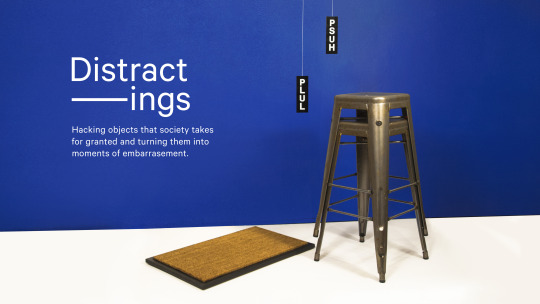
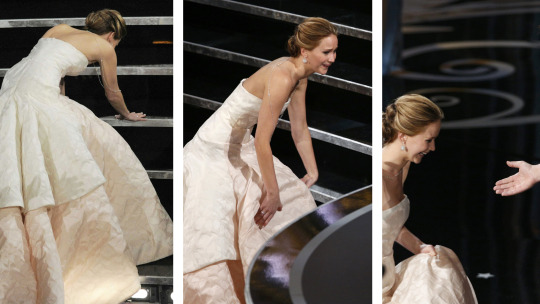
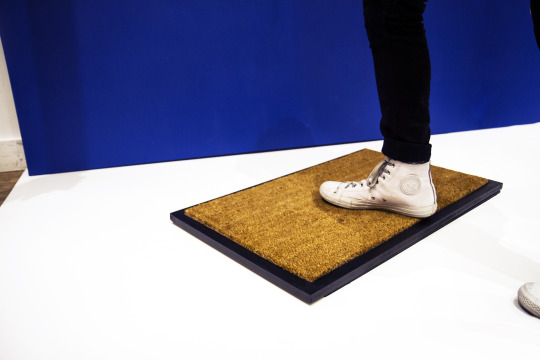
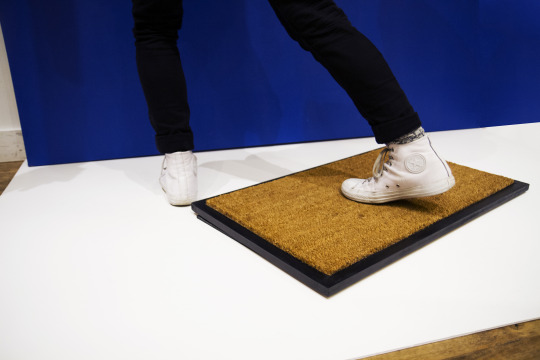
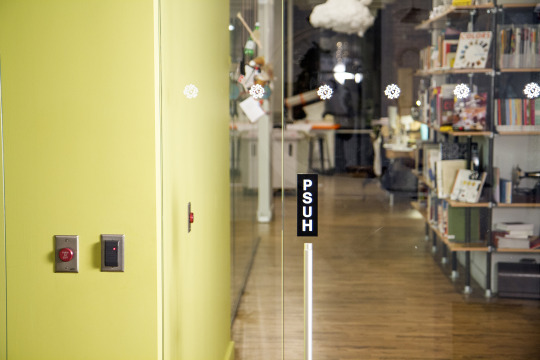




This project was a great exercise that help me figure out ways to distract people from their current state of mind. What I learned from this is there is a need for a resolution at the end when creating a concept of this nature.
In the case of Jennifer Lawerence at the Oscars her resolution was the audience members actually laughing with her and not just at her.
0 notes
Text
Selling Out Alternative
One of my key users is a Student Innovator. This is a young person that is graduating High School entering college or a young person already in college. I am targeting these people because they are looking to explore, they are trying to figure out who they are in the world, who are a part of their social circle and so on.
Companies target these young people so they can grow up with their product and hopes that they become loyal to their brand going into adulthood. In a workshop we came up with the idea of helping people create their own manifesto. A manifesto is a declaration of a person intentions, motives, and views of the world and society. Our current system wants us to live by our current status quo.
My thesis wants to challenge this status quo, but my user wants to live life and have fun without jumping out of the box of the status quo too much. I want to leverage this idea that my user does want to explore and use their off time to discover new things. So I want to bring the challenge to them by presenting alternatives to the places they go to explore and kill time.
1 note
·
View note
Text
Focusing On Media
Coming into the second and final semester of thesis, I needed to begin to focus on a direction where I can have opportunities to execute. I began to read Noam Chomsky’s theories on media and started to piece together that media is a very rich territory that design can have a huge hand in changing. Most of our current media sources are coming from one perspective that promotes consumerism, capitalism, and neoliberalism as the status quo. Recently our society has begun to use social media, which has reinforced this status quo.
Media are gateways that communicate ideas and information to people. I’m starting to look at these gateways as many forms, like television, ads, magazines, blogs, etc. which are used to inform people through an interface in some sort. But I am also looking at other ways of informing that do not have an obvious interface like libraries, shopping malls, and places of congregation where we interact with ideas in a more abstract way (I’m not sure how to say this…it is still cooking in my brain).
Since we live in a society that is backed by a system of acquiring wealth these gateways have been capitalized on leaving little room for free thinking without promotion of a company or product of some sort. So my question for myself is what are some alternatives? How can we balance the chatter of media?
0 notes
Photo
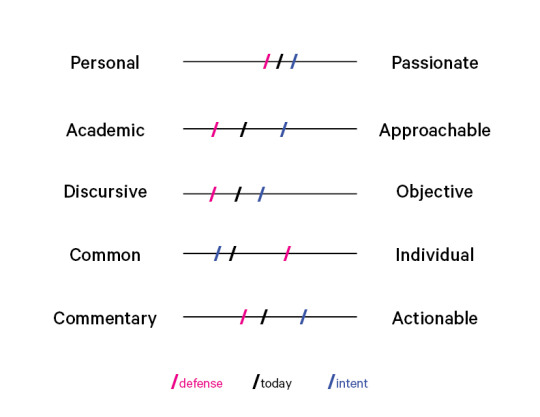
Distractings - Intent
My classmates and I took part in a workshop to understand our intents of our thesis. This was for not only understanding the goal of our projects but it was also for our personal goals. We spat out words that were “negative” and “positive” in regards of our intents of our thesis within this workshop in order to create a continuum.
One of the biggest takeaways from the workshop for me was figuring out if this a personal project or a passion project. I see my thesis as project that I am passionate about and want to be able to work with a company with a similar point of view that aligns with my thesis. It is a topic that I have always been interested in but I don’t want to get so close that it becomes personal.
I am hoping to take the project away from an academic mindset and create ways to collaborate with people in the “real” world. The topic is very complex with an array of moving parts so while I move forward, I would like to make the thesis more palatable and approachable so the thesis as a whole will not seem like it is such an academic pursuit. At this point I am making more of a commentary of the spectacle but I will like to start to pinpoint an area that is more actionable. Overall, my intent for this thesis is to make a great project that can show clients my point of view and my skill set.
0 notes
Text
Users
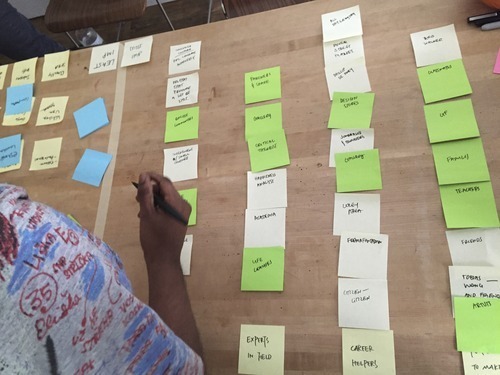
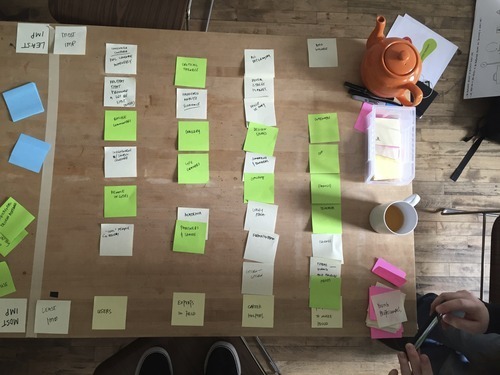
We did an exercise in our Thesis 2 class that started to identify who are the most important groups, people, and organizations in our eyes for our thesis. The exercise prompted us to break up our users, experts, and stake holders into groups of who we want to make proud, who will use our products, who we want to help us further our career, and who are doing similar things in our industry.
The exercise made me realize that I am going after a too small of market. The market I identified and wanted to reach the most are artist, galleries, other designers, agencies and design stores. This is fine, because after my school career is over in the next few months these are the type of groups I would like to work with and for. The reasons I want to reach these people is because I like their attitude, approach, and aesthetic when it comes to design. But I realize that this can just be used as a top layer of my thesis to attract people.
At this point I am creating a lot of “one-liners”, things that only last for a moment; I want to potentially have a larger impact. I am good at creating “one-liners” this isn’t much of a challenge for me. I still want to have the cheeky attitude but embed a larger goal with in the designs I will create for the thesis. I will do this by beginning a dive into thinking about new economic models plus social progress and how it relates to my thesis. Revolting against the spectacle is all about changing the desire for a capitalist society. To really see an impact we would need to look at new economic models and understand that the goal of humanity is to see social and environmental progress. My thesis topic deals more with the social but consuming less and mindfully will surely effect the environment. Bringing this element into my thesis offers something more sustainable, richer, and valuable for my user.
0 notes
Text
How I Got Here.
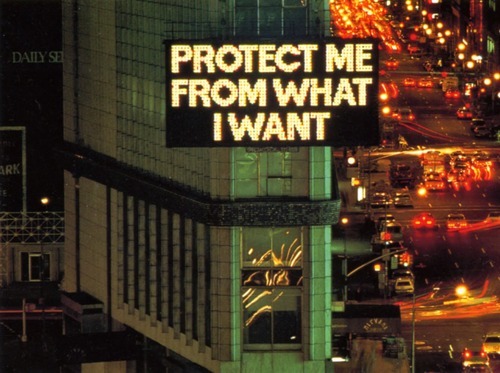
The project above is by Jenny Holzer. The piece voices the feelings I have towards the things that I want versus the things that I need.
Before coming to Products of Design program I was a freelance designer moving from one apartment to the next. My family always questioned why I wasn’t attempting to settle down, find a full-time job, and buy a house. I was always able to brush them off by saying it isn’t really appealing to me. It became a more repetitive question once I moved in with my father for eight months in attempts to save money for my adventure to grad school in New York. I believe that his dream of success, like many others of his generation, was to secure a future by starting a family and investing in a home. But I didn’t believe in that dream. Not because I want to go against what my family wants, but it is because I have lost faith in this dream.
During my short life time I have watched the economy collapse, the job market run dry, thehousing market bubble, divorce rates sky rocket, and so on. The dream my family invested in looked like a nightmare to me and to a lot of people from my generation. So like many other generations of the past we moved on to a new type of dream. A dream that promises independence, a smaller world by way of technology, and an overall sense of living in the moment. Douglas Rushkoff describes this state of being in his book “Present Shock” as a type of infinite Zen like moment that makes us aware of our surroundings, connected with others, and the understanding of ourselves at a fundamental level. But he also goes on to describe that this is not our current state. We are the generation that is in love with the moment instead of being in the moment. We’re more infatuated with sharing our moments instead of being in the moment. We fear of missing other moments instead of enjoying our current moment. We live for others moments instead living for ours.
Our current state of technological advancement has made it possible to demystify large companies, media, and economics by forcing transparency and truthfulness. On the other side of the coin this advancement has created an onslaught of distractions that detour us from the current moment we are in and in result our lives become these distractions. The dream that I prescribed to is letting me down for the same reason why I lost faith in the dream that the generation dreamt up. It is a dream that distracts me from a deeper understanding of myself, others, and my surroundings.
This has been a societal and philosophical dilemma that has been recognized since the days of Socrates and Plato. It is the ultimate question. What is the meaning of life? Today we have narrowed this question down to what is the meaning of my life. This uncertainty is scary as hell. Figuring out our life’s purpose, creating meaningful relationships, and exploring our surroundings; takes a lifetime. Discovering all of these truths is impossible. We can either look at this as an opportunity to live or we can use it to fuel our fears and anxieties. We live in a world of technological advances that opens up new ways of seeing and recognizing the world. Living life comes down to time and how we choose to spend it. It doesn't help that we use fill our time with distractions in order to find meaning. We can dedicate our lives to looking for meaning by doing or we live our lives by feeding into distractions or what critical theorists call the spectacle.
1 note
·
View note
Text
Sam Cooper interviews Mckenzie Wark
The Unreturnable Gift: Berfrois Interviews McKenzie Wark
McKenzie Wark is an Associate Professor of Media and Cultural Studies at The New School. His most recent book, The Beach Beneath the Street: The Everyday Life and Glorious Times of the Situationist International , offers a reconsideration of the movement in terms of its lesser-known participants, its fringe activities, and its relevance for today. He is also the author of A Hacker Manifesto (2004) and Gamer Theory (2007).
Sam Cooper is a PhD Candidate at the University of Sussex. His thesis is titled ‘A Lot to Answer For’: The British Legacy of the Situationist International.
Sam Cooper for Berfrois
There are now a lot of books about the Situationist International, which suggests that there are a lot of different ways to approach the group. How would you characterise your approach?
Wark
The Situationist International is the gift that keeps on giving, in the ambiguous sense that gifts are a good thing but also a problem: We don’t always know how to make them go away. Part of it is that culture works that way. Sometimes things disappear after fifteen minutes, sometimes they disappear after a hundred years. Part of it is that the Situationist International is rich enough for its story to be retold all over again in order to extract a somewhat different array of concepts that speak to our present. I wanted to find the version that would speak to the early twenty-first century. Part of it involved decentering the story. It struck me as unusual that no-one had done this already: No-one had said, “let’s decenter this story away from Paris, let’s write women back into this story, let’s acknowledge the North African presence in the Situationist International”. I didn’t get as far there as I would’ve liked, because the less central figures tend to be less well documented, but let’s acknowledge that this was a transnational network of men and women, speaking several languages, and tell that story instead.
Sam Cooper for Berfrois
You just mentioned what you also state in the first chapter, that you’re attempting to retrieve ‘a past specific to the demands of the present’. In what ways does the version of the Situationist International that you retrieve speak to the present?
Wark
One received version of the story is that the Situationist International is the group that most clearly anticipates May 1968. I think that version is still substantially true, but I also think that May ’68—one of the greatest general strikes in history—isn’t such a great guide to what cultural and political life in the twenty-first century is really like. So what else were the Situationists about? It strikes me that there are several important keys in their body of work. One is the transnational network. How do you create networks across languages, across cultures? I’ve tried to do that myself, so I was interested in their attempts, and where those attempts fell apart.
Another key is that while there is a certain effectiveness in the taking-to-the-streets model of action, it also has severe limits. I found someone like Constant really interesting because he wanted to address a much bigger scale—questions of design at the level of infrastructure—and those things can get left out. At the moment, there is a real fetishising of ‘the Political’, and I think that in an era when politics is so miserably failing, why are our philosophers fetishising ‘the Political’? Isn’t that the last place you’d want to go? So Constant asks, why don’t we think of the infrastructural organisation of life, and how that could be done differently?
New Babylon, Constant, 1959-74
The category of everyday life is now an established one, discussed as an object of study, but how is it to be practiced? What are practices of everyday life? The best known story to come out of the Situationist International about that is the dérive, which involves wandering the streets, discovering new ambiances, constructing new psychogeographies that could contain intimations of what future landscapes would look like if we were free from private property and wage-labour, and so on. That’s great, but it’s a bit of a young man’s game—to roam the streets in a pack, after a few drinks—not everyone can do that, or at least it’s not advisable in an age when there’s a CCTV camera on every street corner. Michèle Bernstein, whom I write about, has a really fabulous and less masculinist version of what the experience of the everyday could be like. She’s also interested in love, sex and romance, as games played out in the space of the city, in ways that aren’t about treating other people as your property. I don’t know if it’s also called ‘hook-up culture’ in the UK, but in the US there’s been a transformation in how young people think about love and sex and everyday life, and Bernstein’s two novels anticipate that in really interesting ways.
Sam Cooper for Berfrois
You mention in the book that you want to defend ‘low theory’, which is a concept that seems to relate to these practices of everyday life. What do you mean by ‘low theory’, and how is it connected to the Situationist International?
Wark
Well, the American university is where so-called ‘French theory’ was actually invented, and not in philosophy departments but via comparative literature, other literature departments, sometimes media studies, and various other places. So you couldn’t quite call it philosophy—it got called ‘theory’ and sometimes ‘high theory’. You end up with this construct, based essentially around the reception of Derrida into the Anglophone world through these centres of intellectual power in the US. And this is interesting, but it occupies a certain kind of terrain, a certain space. It requires a certain training.
I’ve always been much more interested in something else: The self-conscious attempt to construct conceptual practices outside of formal settings. That is what Marx did, it’s what Freud did, it’s what Benjamin did; I’d even say it’s what Nietzsche did, because of course he’s on ‘permanent leave’ when he’s writing all these amazing books, when he’s already losing it. Somehow, these guys are all now ‘high theory’, but that’s not where they came from whatsoever. Marx is not a philosopher, Freud is not a philosopher, Benjamin is not a philosopher; I’d even say Nietzsche is not a philosopher. They’re all doing ‘low theory’, and I’m trying to tell stories that fit into that tradition, maybe not at that level, but as a whole other way of thinking about the practice of knowledge in everyday life. This puts on the table the question of the politics of knowledge in a way that can’t be directly asked, or answered, in the space of the university.
Asger Jorn, photograph by Børge Venge
The jury will be out for a hundred years as to whether anything by the Situationist International is of the same quality [as Marx, Freud, Benjamin, etc.], but one makes the case. In the work ofAsger Jorn there is some astonishing stuff. He was trying to ask, what is the practice of the class to which an artist belongs? This is a pretty astonishing question to be asking in the Fifties, when artists either imagined themselves to be petit-bourgeois peddlars of their own souls, or they tried to align themselves with the working class through being communists, as even Picasso tried to do. Jorn asks, is there another way to think about creative practice?
Sam Cooper for Berfrois
The language and the style of your book seem to conjure something of the Situationist project, which seems to have been a tactical decision on your part, consistent with this idea of ‘low theory’. How does the book’s style relate to its content?
Wark
I am, first and last, a writer. Like any writer, I’m interested in good examples of the craft. The danger is that you read really good stuff and you end up imitating it. I’ve certainly done that. I have whole notebooks of stuff that reads like Debord in translation. He’s an astonishingly interesting writer in French, and a lot of it survives in English translation. I didn’t want to write a book that imitated him, but I did want a certain prickliness in some of the prose, a certain spiky quality. So it was an exercise in style, in finding a style appropriate but not imitative.
This book came after two books that are straight-up détournements of Situationist texts: AHacker Manifesto and Gamer Theory were rewritings of the two canonical Situationist texts, Guy Debord’s Society of the Spectacle (1967) and Raoul Vaneigem’s book, known in English as The Revolution of Everyday Life (1967). So it’s taken me three books so far, and I haven’t even arrived at Debord’s late prose which I think is particularly valuable. While I’ve tried to decenter the story away from Debord, he is still the Situationist International’s best writer. I love Jorn, but his writing is really torturous: He’s a good bad writer!
Sam Cooper for Berfrois
The Situationist International maintained that it never offered itself up to academic study, or to translation into other types of discourse. They were very wary of being appropriated for ends other than their own. How have you dealt with that dilemma?
Wark
I don’t think this is so unique to Situationist texts. Any work worth paying attention to usually tries to armour itself against certain kinds of appropriation, which itself reveals a nervousness, a sense of inevitability, about appropriation. I’m sure the Situationists felt this way. After all, they came up with the theory of détournement—that the whole of culture works by plagiarising itself because none of it is private property and all of it belongs to everybody. The Situationists even say that the best example of détournement is advertising, which plagiarises anything of any interest and attaches commodity desire to it. So, if that was your theory, you would get incredibly nervous about the fact that it’s inevitable that you’re going to be appropriated!
I did a little book, as a trial for this one, called 50 Years of Recuperation of the Situationist International. I showed this to an artist friend, and he had a fantastic response, “50 years of recuperation of the Situationist International? May there be 50 more!” And I thought, thank you! That is exactly right! The work that is valuable in culture in the long term is the unreturnable gift, the thing we just don’t know how to get rid of. I’m sorry to say, love her or not, Amy Winehouse: There’s an art that, in a couple of years, we could be done with. It’s a gift we can return, it’s probably not up there (though I could be proven wrong). We can repay that one and it’ll go away. But this one, the Situationist International, it just won’t go away.
Situationist leaflet, Denmark. Photograph of Christine Keeler by Lewis Morley, 1963
Sam Cooper for Berfrois
Were there aspects of the Situationist project that you found, now, to be redundant or to have been outflanked by politics or by history?
Wark
I’m reluctant to trade in that wisdom of hindsight, but in this sense of the unreturnable gift, all of the Situationists’ work is simultaneously redundant and not. As I was saying, the dérive is now hard to do: in the age of the CCTV camera, there is no available invisibility in that sense. The concept of spectacle has certainly evolved way past what Debord described—it didn’t get any better, it got worse.
But then Constant’s utopian schemes, for example, are to me very poignant. He imagines the ability to change global climates: he didn’t realise that actually we’ve already done that, inadvertently. There is a pathos there that is both dated and not. So, my answer is that these stories about the Situationist International are rooted in very particular histories. The historical nature of conceptual thought is something worth stressing at the moment: there is no eternal, Platonist, political universe that you can extract, as is now common to think. The moment that a good concept speaks to is, at one and the same time, the day on which it was published and the century in which it happens.
Sam Cooper for Berfrois
How did you, personally, come to the Situationist International? How have your own activities informed your understanding of the Situationists?
Wark
Having been a militant in my youth, and then living through a peripheral but nonetheless interesting bohemia, I was interested in those two spaces. Eventually I became an academic, but I’m still more interested in those other spaces; they are where I get ideas from. In the Eighties and Nineties I was involved in avant-garde movements of probably no great historical significance, but we gave it a shot. We were interested in media, the internet. We weren’t techno-utopians, we were quite tactical. I wanted to write about that, and failed, but I asked myself, what was the book most of us read? It was Society of the Spectacle. So I re-read that, which lead toHacker Manifesto and Gamer Theory. The Beach Beneath the Street is, in a sense, a prequel to those two. It excavates a bit more thoroughly what I thought I was doing in those texts.
view original posting here.
0 notes
Text
Creating new spectacles out of old ones
Checking our phones and social media most likely won’t go away. And this thesis is not about destroying everything about society. It's about creating balance and the search for meaning. The web is great platform to show content and circulate that content. But where does the content come from? How can we create new ideas when it is so easy to circulate the same content over and over again? And once that content is created and put into a feed there is a disconnection to most of the content that is on the feed. Unless the user has sought out to create a feed that is consistent with the type of content that have similarities and would "feed" off of each other. But this would be a magazine or some type of publication. So our social media feeds are where all of the content is disconnected (but social media is supposed to connect us) and we circulate these images that we don’t own constantly. All of this can result to mostly numbness and just life turned into moving images.
What if these images had a shelf life and became passing moments that we could not revive at a whim? What if social media was about adding a peace to a puzzle? Creating new spectacles out of old ones section of my prototypes and sketches explored our interaction with social media. One prototype was the dying image. The more the image is posted, liked, or commented on the more the picture will fade out. The second prototype was trying to create one cohesive post out of four post that would seem random in the context of a viewers feed on Instagram. I asked four different people to say a part of a two sentence statement written in Guy Debord's book "The Society of the Spectacle." I attempted to pick people that belong to different circles on Instagram in order to keep the post more random and on different timelines. The statements were recited on video and posted in order. But together (with the use of a hash tag) the videos made a complete thought.
0 notes
Quote
Progressives should have learned to build a politics that embraces the dreams of people and fashions spectacles which give which gives these fantasies form - a politics that employs symbols and associations; a politics that tells good stories. In brief, we should have learned to manufacture dissent.
- Stephen Duncombe "Dreams"
1 note
·
View note
Photo

The first moment of distraction prototype explores the possibilities of creating a threshold that would distract the person from their current state of mind. What I mean by current state of mind is the thoughts that are going through the person's mind when they are beginning to start their day or ending their day. In theory these thoughts would be the tasks that they either are going to do or thoughts that they have/should have done throughout the day. I created a welcome mat that with slightly move when stepped on, causing the person to be disorientated for a moment ultimately distracting them from the thoughts of what is going to be done, what should have been done, and what has been done , even if it is for just a moment,.
0 notes
Text
Moments of Distraction
The moments of distractions concepts dealt with how we navigate, our mind state when leaving one setting to another, and the objects that we use to communicate with others.
The first moment of distraction prototype explores the possibilities of creating a threshold that would distract the person from their current state of mind. What I mean by current state of mind is the thoughts that are going through the person's mind when they are beginning to start their day or ending their day. In theory these thoughts would be the tasks that they either are going to do or thoughts that they have/should have done throughout the day. I created a welcome mat that with slightly move when stepped on, causing the person to be disorientated for a moment ultimately distracting them from the thoughts of what is going to be done, what should have been done, and what has been done , even if it is for just a moment,.
These moments are a bit annoying, but distracting. This is what these first prototypes of moments of distraction were supposed to be distracting. Today we are never offline. Our phones allow us to plan our days to the second and we set reminders to let us know what things are on our plate. But I fear that we do more planning, emailing, and contacting others during the day than actually doing the stuff we are planning to do.
In this moment of time social media is an apparent component of society's spectacle. We care about the opinions and lives of associates and total strangers more than the people around us and more importantly the life we are living. There is definitely an issue of being here now. This leads to the second prototype created, social warning labels. These labels would be placed on phones, guerrilla style, that will have a hand written warning that warns users the social dangers of the phone, like "This phone may cause loss of eye contact with others." The clear sticker is distracting and makes it hard to interact with the phone. Even though most users will just peal the sticker off there is small moment there where the user will agree with the warning sticker. I have a hunch that society as a whole realizes that cell phones and social media alienates us but it has become habitual to check things on your phone and social media.
0 notes
Text
Reflecting On Sketches & Prototypes
The work I am creating at this point deals with distracting society from itself. I began looking at myself and my circle of people around me as inspiration. The ideas deal with how we interact with daily life on a day to day basis. Looking back at the sketches I began to create buckets for the ideas. The three main buckets were moments of distractions, creating new spectacles out of old ones, and the absence of the spectacle.
0 notes
